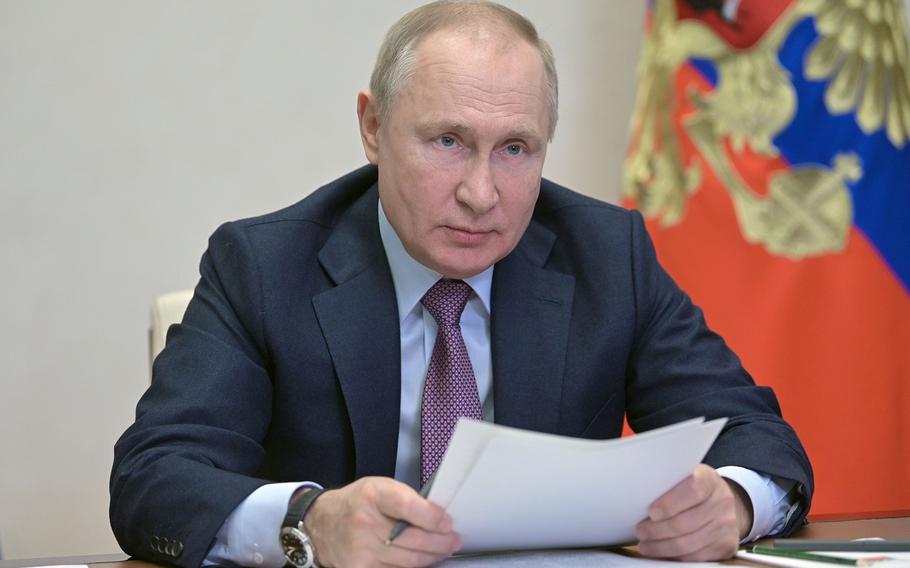
Russian President Vladimir Putin attends a cabinet meeting via video conference at the Novo-Ogaryovo residence outside Moscow, Russia, Friday, Dec. 24, 2021. (Alexei Nikolsky, Sputnik, Kremlin pool photo via AP)
The Grinch did not steal Christmas this year, but Russia President Vladimir Putin did his level best to cast a shadow over our holiday spirit. The Kremlin killjoy has been doing his yearend press conference for two decades, starting in 2001.
His latest such interchange with the media, on Dec. 23, featured his usual impressive performance. This drama is certainly preferable to the grotesque show trials of Josef Stalin’s Soviet Union.
Russia’s president held forth for over four hours, alone an ordeal. Throughout, he showed impressive self-confidence as well as command of considerable specific information.
The interchange was not completely spontaneous but also not completely scripted. This was not a “show” press conference. Worthwhile insights into official thinking did result.
The conference took place in-person in a large Moscow hall. Last year, the event was remote from Novo-Ogaryovo, a luxurious suburban estate. Putin does not live like the workers.
Putin demonstrated chutzpah on various fronts, including regarding the economy. Real incomes grew by approximately 3.5% this year. Averting total economic collapse two decades ago remains a primary accomplishment. Nonetheless, those incomes remain lower than in 2013. Inflation has reached at least 8.4%.
Russia remains an important source of world petroleum supply, and heavily dependent on that income. Such dependence guarantees fundamental weakness.
Of particular importance, and generally underreported, are comments about the Central Bank of Russia. Putin acknowledged broad complaints about the relatively high interest rates instituted to combat inflation. He not only defended this as necessary, but also underscored the importance of an independent central bank authority.
This is pure capitalism, though Putin of course would never so state. The abandonment of the previous state-controlled command economy is complete. A market economy, however unsteady and corrupt, is in place. Undeniably, the discredited, failed communist system is dead.
Putin demonstrated quickness of mind but not always candor or directness. Among other examples, he was dismissive of the ordeal of Alexei Navalny, a prominent dissident highly influential on social media.
Novichok, a nerve agent used against other individuals at odds with the Kremlin, attacked Navalny. He is alive thanks to emergency evacuation to Berlin. After partial recuperation, he returned voluntarily to Russia where he was immediately arrested and remains in prison.
Courageous Navalny personifies limited but growing opposition to the Putin regime, which after two decades is now increasingly repressive. Management of the latest press conference reflects this harshness.
In the past, media applied for accreditation. This time, by contrast, the Kremlin selected those who could attend. Approximately 500 domestic and international press representatives participated.
Among publications excluded was the newspaper Novaya Gazeta. Managing Editor Dmitry Muratov just received the Nobel Peace Prize. Fellow journalist Maria Ressa of the Philippines also got the prestigious award. Both demonstrate great courage in opposing repression, resisting intimidation, thereby risking their lives and their careers.
Media understandably focus on Ukraine, where Russia’s ominous military buildup continues. Putin heatedly asserted NATO is the provocateur, which is false.
Throughout this year, Russia’s military forces have engaged in provocative actions, in and around Ukraine and reaching well beyond, throughout the NATO region. Near misses involving aircraft are particularly worrisome.
Putin’s boasts, including at his press conference, of exceptionally advanced new weapons are worrisome. Questions do remain about how much of this expansive rhetoric reflects actual facts regarding technological advance.
Russia’s border anxieties are intense, reflecting long history of brutal invasions. We should seek diplomatic confirmation of border stability, and complement bilateral negotiations scheduled for early next year through involving Europe.
Realism should guide policy, emphasizing the essential role of nation-states, and focus on national interests. A source of basic U.S. strength is our market economy, increasingly the way of the world. Russia today remains influential but isolated.
Learn More: John Mearsheimer, “The Great Delusion: Liberal Dreams and International Realities.”
Arthur I. Cyr is author of “After the Cold War.”